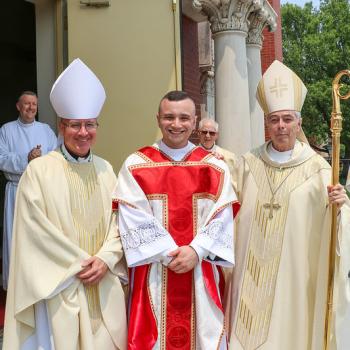There are three things, my brethren, by which faith stands firm, devotion remains constant, and virtue endures. They are prayer, fasting and mercy. Prayer knocks at the door, fasting obtains, mercy receives. Prayer, mercy and fasting: these three are one, and they give life to each other.
Fasting is the soul of prayer, mercy is the lifeblood of fasting. Let no one try to separate them; they cannot be separated . . . ~ From a sermon by Saint Peter Chrysologus, bishop, Office of Readings, Tuesday of the Third Week of Lent
Since coming into the Church in 1996, I have more or less eagerly embraced the Lenten fast. For many years I "gave up" coffee, a near martyr-like effort for a caffeine addict such as myself. For the last several years, I switched to sugar, a feat that likewise could only have been achieved with supernatural help. Even so, Easter morning I went to the 7-11 before Mass, bought a bag of Gummi Bears—because by that time I didn't want any fancy bittersweet chocolate, I wanted cheap cane sugar in as unadulterated a form as possible short of simply scarfing the stuff with my hands from a five-pound bag—and the minute I got back to my car, dug in.
The object from which I chose to fast, I realized, was the least of Lent, and at the same time, the fasting was a major focus. (Hard to believe the luster a, say, Lindt bar acquires in the absence of booze, drugs, nicotine, sex, junk food, and TV.) So as Lent approached this year, I thought: Those people who say fasting is just an ego-based endurance test are right. I'm going to do something different this year. I am going to fast from badmouthing people. I am going to fast from something that can effect some actual good.
Ash Wednesday dawned, I waited to be transformed from within, and about an hour and a half later I was nitpicking at people: maybe just in my head, but still. A few days later I badmouthed someone out loud; the day after that I nakedly passed on a bit of juicy gossip, and things went downhill from there. I was praying for people. I kept praying not to badmouth, and one more time, there I'd be. Well, this is just going to show me my hardness of heart, I thought. This is going to be a real lesson in humility.
I finally realized what it was really going to be was business as usual, and that I was poised to skate through Lent basically unscathed. That was when I read the above quote from St. Peter Chrysologus and realized: Nice try, but unh-unh. Prayer without fasting is a gesture. Mercy without fasting is a gesture. Fasting is not a gesture. Fasting is where things get real.
So three weeks in, I began fasting from sugar, and—interestingly enough—right away I noticed my badmouthing diminished. I gave away some money. I went to Mass that weekday and I've been every day ever since, walking the twenty minutes to St. Francis or the fifty minutes to Our Lady of Good Counsel, because walking always makes things a tiny bit of a pilgrimage. Walking, your feet, back, and legs hurt just a little. Walking is to slow down and walk the Via Dolorosa with Christ.
Why is this? Why the connection between mercy and fasting? Maybe it has to do with a concept emphasized by spiritual writer Ron Rolheiser: that as followers of Christ, we are called to hold a certain amount of tension. We're called to hold the tension, as Christ held the tension of the whole world on the cross, of emotional and sexual loneliness, our craving for recognition, our perpetually conflicted psyches. I never think of myself as having that much of a sweet tooth, but take away the sugar in my first cup of morning coffee, the honey in my yogurt, the square or two of afternoon chocolate, and you take away a major source of comfort, pleasure, and temporary release/relief.
And in that tiny "desert," bereft of my usual anesthesia, I am suddenly given to see the tension that so often precedes as well the making of a snarky comment or an unfounded judgment or a thinly-disguised character assassination.I'm afraid I'm a loser so I try to make someone else look bad. I'm afraid people are judging me, so I judge someone else instead. I can't bear to suffer the tension of the human condition, so I subconsciously try to make another suffer in my place. (Because let's face it, it is unbearable. We couldn't bear the tension, if not for Christ.)
In a sense, Christ came to address this precise, profoundly evil urge. Crucify him! we say on Good Friday, but we'd more accurately put the emphasis on "him." Crucify him, crucify her. Crucify anyone but me.
Fasting reminds us that our culture is one giant narcotic and if we don't pay attention, we can skate through our whole lives anesthetized, asleep, numb. Fasting reminds us that Christianity is not to continue to do what we've always done while tacking on a nominal good intention or two. Christianity is not a gesture. Christianity is not a vague wish for goodwill. Christianity is to be stripped, in the name of love, of all that is familiar, safe, anodyne, and nailed to a cross.
As Thérèse of Lisieux neared the end of her life at the Carmel cloister, her sister Céline, frustrated at having so much less charity than she would have liked, exclaimed, "Oh, when I think how much I have to acquire!"
"Rather," Thérèse replied, "how much you have to lose."
4/5/2011 4:00:00 AM





